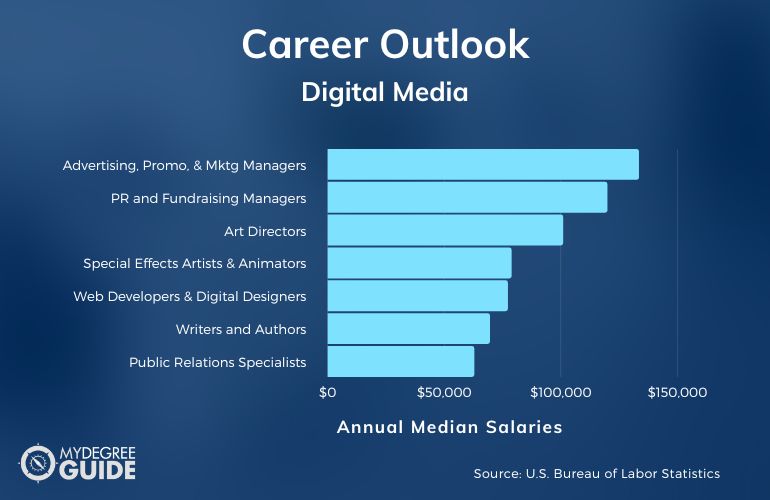If you’re looking for a collaborative way to explore multimedia, web design, visual language, or film and video, then you might consider pursuing an online masters in digital media.

Digital media is used in a wide range of industries. Whether you’re interested in audio or film production, broadcasting, or digital design, you can choose a degree concentration to tailor your studies to your career goals.
Editorial Listing ShortCode:
As you explore collaborative and innovative thinking, you’ll likely have the chance to study entertainment, digital marketing, and mobile app development.
Online Masters in Digital Media Programs

Digital media studies combine technology and creativity. An online master’s degree in digital media can help you develop your skills related to using, managing, and creating digital media content.
You can study a wide range of subjects that tackle areas like:
- Entertainment
- Mobile app development
- Digital marketing
- E-commerce
- Digital design
- Communication
This field includes animation and motion graphics and interactive media as well. A digital media master’s degree also covers foundational principles of design, media theory, technology, and creativity. You can learn to leverage your technical skills and various forms of expression to expand your reach upon a target audience.
Editorial Listing ShortCode:
A digital media masters program can allow you to explore digital media while embracing advanced technology. You can develop your skills and expertise in regards to utilizing technology and creativity.
Common Online Master’s in Digital Media Concentrations

Many online masters degree programs in digital media offer concentrations that allow you to specialize in a certain sector within digital media. Here are some common digital media specializations:
- Digital media production. This concentration involve various aspects of motion pictures, such as digital effects, screenwriting and editing, producing, and audio production.
- Animation and modeling (2D/3D). A concentration in animation and modeling focuses on artificial effects and environments, textures and lighting, and character modeling techniques. This program will explore how art is created in both 2D and 3D space.
- Experience design. With this concentration, you’ll have the opportunity to support user behavior through usability. This design process draws on the needs and feelings of others, centering on the experience of the user.
- Interactive media design. Interactive media design covers everything from video motion graphic skills to web design and programming. This concentration can also offer insight into other technological studies.
- Visual language. A visual language concentration can prepare you to utilize visual elements to communicate an intended meaning. Visual language takes visual units and construes them into meaningful shapes and symbols. This concentration can be beneficial for fields like advertising and graphic design.
Your chosen concentration can decide the direction you take in both your academic and professional career path.
Digital Media Careers & Salaries

Careers in digital media are quite diverse. Your qualifications and career path may be determined by your chosen concentration and level of experience.
According to the Bureau of Labor Statistics, here are some careers related to the growing field of digital media.
| Careers | Annual Median Salaries |
| Advertising, Promotions, and Marketing Managers | $133,380 |
| Public Relations and Fundraising Managers | $119,860 |
| Art Directors | $100,890 |
| Special Effects Artists and Animators | $78,790 |
| Web Developers and Digital Designers | $77,200 |
| Writers and Authors | $69,510 |
| Public Relations Specialists | $62,800 |
| Film and Video Editors | $62,680 |
| Graphic Designers | $50,710 |
| Broadcast, Sound, and Video Technicians | $48,050 |
The most relevant industries offering work to digital media graduates include the entertainment, e-commerce, technology, and communication sectors.
Digital Media Master’s Curriculum & Courses

Here are examples of some courses you’re likely to find in a digital media masters program:
- History and Theory of New Media: You’ll study theories and trends within the fields of media and computer technology. This course provides a comprehensive examination of the evolution of cyber studies, new media arts, media ecology, and media archaeology.
- Studies in Digital Media: You’ll explore emerging technologies and their impact on digital media, and you’ll likely study rules regarding media authorship and manipulation.
- User Interface Design: You’ll study interface design methods along with essential visual elements. You’ll often round out your education by looking at both psychology and programming, as they relate to user experience.
- Data Visualization Methods: You’ll discover how to use and display data, learning various methods and formats for communicating complex information.
- Multimedia Communication: From multimedia design to editing and web media, this course will explore the different forms of digital media communication. You can also learn how to understand the transfer, services, protocols, and mechanisms of text and graphics.
- Audio Production: This course covers the key components of studio audio production, including digital audio engineering and production workflow.
Exact coursework will differ between schools and programs, and your courses may also be impacted by a chosen degree concentration.
Digital Media Graduate Program Admissions Requirements

While admissions requirements can vary from program to program, the following are common criteria for admission to a digital media masters program:
- Writing samples and an online portfolio
- Letters of recommendation
- Personal statement or statement of intent
- Minimum undergrad GPA of 3.2, on average
- Intermediate technology skills
If you want to pursue a digital media master’s online, you might need instructor feedback showing you’ve achieved remarkable technical competency.
Accreditation

Accreditation refers to the process by which an academic institution’s academic quality is continuously reviewed.
To maintain a level of accreditation, universities must meet certain criteria in regards to their academics and their student services. Regional accrediting organizations are recognized by the Council for Higher Education Accreditation (CHEA).
Editorial Listing ShortCode:
Attending an accredited institution can sometimes be a precondition for receiving financial aid, transferring credits, and meeting industry standards.
Financial Aid and Scholarships

Financial aid is available to many students who meet income eligibility. Grants, work-study programs, student loans, and scholarships are all different forms of financial aid. You can explore your scholarship opportunities from your school and local organizations.
To apply for federal student aid, you can start by filling out the Free Application for Federal Student Aid (FAFSA). Your FAFSA can also help determine your eligibility for state aid. Some employers also offer tuition assistance to workers who are pursuing higher education to improve their craft.
Is Digital Media a Good Major?

Yes, digital media is a good major for many undergraduate students. According to the Bureau of Labor and Statistics, demand for media and communication occupations is on the rise. Now more than ever, you can find opportunities to create, translate, and demonstrate information.
Since digital media is a vast field, there are a range of careers that graduates tend to pursue. Many digital media careers also offer above average salaries. For instance, broadcast, sound, and video technicians make a median salary of $49,050 per year, and web developers and digital designers earn a median of $77,200 (Bureau of Labor Statistics).
Management positions tend to earn higher salaries. For example, the median salary for advertising, promotions, and marketing managers is $133,380 per year (Bureau of Labor Statistics).
What Can You Do with a Masters in Digital Media?

Professionals with masters degrees in digital media work in a variety of positions, depending on their area of expertise. Some work as brand strategists, user experience designers, social media specialists, or copywriters.
Others enter the entertainment sector, working as film and video editors, audio or video technicians, or art directors. Advancing your qualifications and expertise with a masters degree may also increase your earning potential and prepare you for leadership roles.
Some digital media professionals work in senior or management positions in advertising, marketing, or public relations.
How Long Does It Take to Get a Digital Media Masters Degree Online?

If a masters degree program consists of 36 credit hours and no thesis requirement, it generally takes 1 year to complete with full-time, year-round enrollment.
If a thesis is required, it will often add additional time to your completion. Enrolling in a program part-time may also take you longer to finish, though you may benefit from a more flexible schedule. Many programs vary in their length and course requirements, so you may want to explore a variety of programs if you’re interested in finishing quickly. Likewise, some online digital media degree and online graphic design degree programs also offer accelerated courses.
Is a Masters in Digital Media Degree Worth It?
Yes, a master in digital media degree is worth it for many students. Digital media connects people in unique and creative ways, and the Bureau of Labor Statistics currently projects 14% job growth for media and communication occupations over the next ten years.
Editorial Listing ShortCode:
A masters program in digital media can enable you to embrace new methods of communicating complex information and prepare you for a career in a wide range of industries. Common careers in this field include public relations manager, marketing manager, social media specialist, graphic designer, multimedia artist, copywriter, sound engineering technician, and video editor.
Universities Offering Online Masters in Digital Media Degree Programs
Methodology: The following school list is in alphabetical order. To be included, a college or university must be regionally accredited and offer degree programs online or in a hybrid format.

Arizona State University offers an online program for a Bachelor of Science in Digital Audience Strategy. The program requires the completion of ten classes, which are each 7.5 weeks long, for a total of 30 credit hours to graduate. The program can help prepare students for work in corporations, advocacy groups, government organizations, news organizations, and nonprofits.
ASU is accredited by the Higher Learning Commission.

Drexel University offers an online Master’s in Digital Media program. Synchronous classes are 100% online. Students also have the opportunity to participate in a summer workshop with a 6 week residency component. The program requires the completion of 45 credits and a thesis to graduate. Applicants need a minimum undergraduate GPA of 3.2 to be eligible.
Drexel University is accredited by the Middle States Commission on Higher Education.

Lasell University offers a Master of Science in Communication—Digital Media. The program covers how to manage social media platforms, use data analytics to measure the impact of media campaigns, and apply SEO and SEM. Students also have the opportunity to earn a HubSpot Social Media Certificate.
Lasell University is accredited by the New England Commission of Higher Education.

Loyola University—Maryland offers an online Master’s in Emerging Media program. Classes are asynchronous for the benefit of students with busy or irregular schedules. The curriculum focuses on cutting-edge media and technology. Students also have the option to get a specialization in Health Communication.
Loyola University Maryland is accredited by the Middle States Commission on Higher Education.

Northeastern University offers an online Master’s in Digital Media program. The degree typically takes 15 to 24 months to complete, and students can take classes either full-time or part-time. The program is designed to enhance collaboration and networking opportunities. Students are required to complete an in-depth capstone project under the guidance of a faculty advisor.
Northeastern University is accredited by the New England Commission of Higher Education.

Pace University offers a 100% online program for an MA in Communications and Digital Media. It requires the completion of 36 credits to graduate and can potentially be completed in just a year and a half. Optional concentrations are available in Digital Filmmaking and Media Production and Social Media and Public Relations.
Pace University is accredited by the Middle States Commission on Higher Education.

Rutgers University offers a Master of Communication and Media with a specialization in Digital Media. The program is completely online, but some face-to-face classes are also available. Courses include Digital Media Innovation, Media Studies: Theory and Practice, Digital Media Production, Organizational Leadership, Social Media, and Organizational Assessment.
Rutgers is accredited by the Middle States Commission on Higher Education.

Southern New Hampshire University offers a Master’s in Digital Marketing online program. It can potentially be completed in just 15 months. The program is designed to help students learn how to use digital and social media data to inform decision-making and prepare them for earning HubSpot and Hootsuite certifications. GRE and GMAT scores are not needed to apply.
Southern New Hampshire University is accredited by the New England Commission of Higher Education.

Syracuse University offers a Master’s in Communication with a specialization in Media Management. The program requires the completion of 33 credits, including 12 for the specialization. Courses include Diversity, Inclusion and Leadership, Advanced Social Media, Applied Media Research, and a choice of management courses.
Syracuse University is accredited by the Middle States Commission on Higher Education.

Valparaiso University offers a Master of Science in Digital Media. Students are required to complete 37 credits to graduate. The program covers how to manage digital media resources and anticipate the changing direction of digital media. The degree can potentially be completed in just 15 to 18 months. Courses include Graduate Digital Media, Cinema Production, and Web Design.
Valparaiso University is accredited by the Higher Learning Commission.
Getting Your Masters in Digital Media Online

Much like a multimedia degree online, an online masters degree in digital media can allow you to explore a wide variety of creative subjects. From web design to multimedia and visual language, digital media programs offer varying concentrations you can choose from.
Whether you’re new to the digital realm or looking to brush up on your digital communication skills, a masters in digital media can help you advance your knowledge and expertise in this ind-demand field.
You can start exploring accredited universities today to find the digital media masters online program that best aligns with your personal interests and professionals goals.

